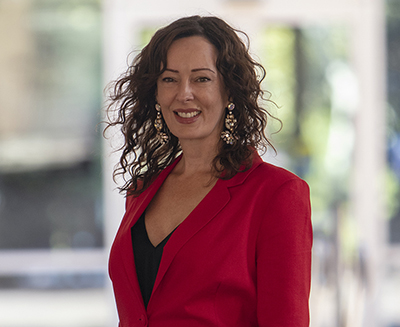
Anita Casavantes Bradford
Professor of Chicano/Latino Studies
As a new Full Professor, there are so many things I wish I’d known sooner!
First: I wish I’d known, when I was newly tenured and planning out the pathway to Full, how much harder it would be to balance writing a second book with the new service responsibilities that inevitably come with tenure–and particularly for those of us who identify as members of communities underrepresented in academia. Although I am deeply committed to advocating for minoritized and first generation students-and consider it a pleasure to serve my campus–as a mid-career faculty member, I became increasingly aware that there are a handful of URM faculty who are repeatedly asked to serve on the same panels and committees. They also perform the overwhelming majority of DEI work. The hours we dedicate to these campus-sustaining efforts are hours we are not advancing on book and article projects that will get us promoted at the same pace as colleagues who perform less service. To be clear: I’m not suggesting underrepresented faculty should stop doing service altogether–or that we come to see it only as a drain on energy that should be dedicated to ‘more important’ things. Rather, I believe that our universities need to find ways of acknowledging how important our sometimes-invisible service is to our institutions’ viability; of distributing service work more transparently and equitably; and of offering tangible rewards to those who perform exceptional service. But since we’re not there yet, I wish I’d known earlier how to say no gracefully but firmly–something I DID figure out a couple of years ago–by doing the following:- Offering thanks for the opportunity to serve
- Recognizing the importance of the task you’re being asked to do
- Expressing your regret that you’re unable to accept this time, because
- You’re really busy doing (list 1-2 really important research/teaching/service activities you’re engaged in right now); and finally,
- Reiterating that you hope you’ll have another chance to collaborate with them in the
future.
Second: I wish I’d known earlier the importance of consciously harmonizing your career and life cycle stages with your long-term research trajectory. Crucial to this at the mid-career stage is finding ways to leverage your pre-tenure research as a ‘launching pad’ for the second major phase of your research. It may sound obvious, but it bears repeating: if you can draw on the same literature/theories/methods that framed your first book or collection of articles in subsequent projects, you’ll maintain momentum and save a lot of time and effort moving forward. In my case, after tenure and my first book, I started work on a second project –one I also thought would be a book–that expanded on earlier research. However, after writing a couple of articles, I decided to abandon the topic and launch a new and extremely ambitious book project that required me to familiarize myself with multiple additional bodies of literature AND search out a vast network of archives across the country. I’m very proud of this book, but finishing it was the most exhausting thing I’ve ever done! Looking back, in light of the unique challenges of the mid-career stage, as well as the life cycle of my family (my daughter was in kindergarten when I changed projects), it might have made more sense to finish the less challenging (but still meaningful) project, and THEN, following promotion to full, embark on the more ambitious book. If I’d done this, I could have taken the time to enjoy growing into new fields at the more measured pace that full professor status allows. This would also have allowed me to spend more time with my family at a time when they needed more of me–and to enjoy more of my daughter’s quickly passing early childhood.
Third: I wish I’d known earlier that it was important to start planning early in my mid-career years to ensure that the leading scholars in my fields were familiar with my work, so that I would have a range of exciting potential external letter writers for my promotion case. I’m naturally an introvert, so networking, introducing myself to people at conferences, and cold-emailing scholars I admire at other institutions do NOT come naturally to me. Thankfully, I attended a meeting of mid-career women of color faculty arranged by the VP for Academic Personnel’s Office in my third year as an associate professor, and they stressed the importance of making a plan for doing exactly these things. I made a list of the people I needed to know about my work, and over the next several years, found ways of reaching out to them through professional associations and mutual acquaintances. It paid off: several of these new contacts were among the most enthusiastic letter writers on my promotion case. I’m grateful I learned this lesson just in time, but you can’t start building these relationships soon enough.
There’s more, of course; too much to cover in a short reflection. If you’re a mid-career colleague currently on the path to full and want to keep talking about these things, please feel free to reach out. I’m happy to continue the conversation!



